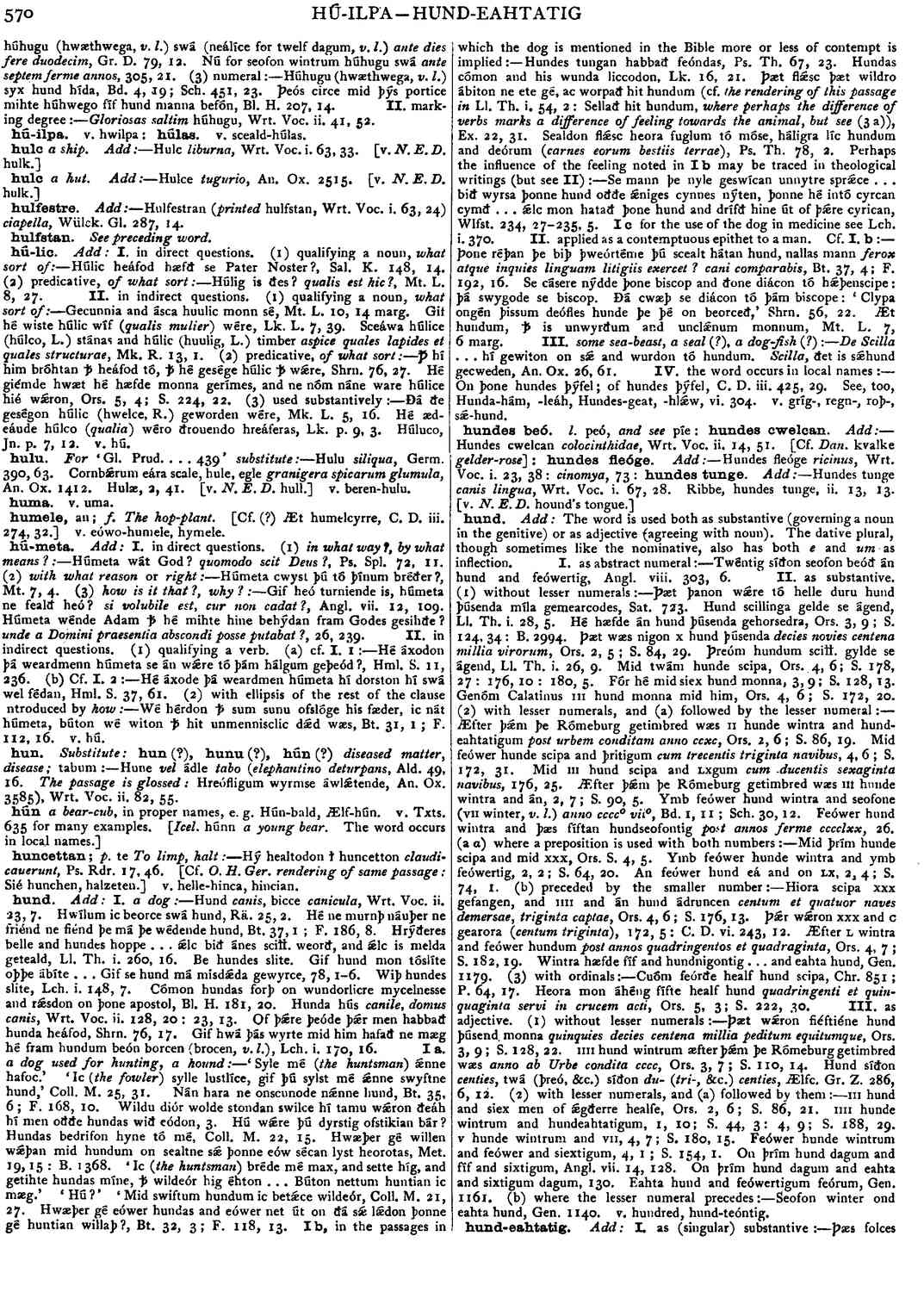hund
-
Hund canis, bicce
canicula,
- Wrt. Voc. ii. 23, 7.
-
Hwílum ic beorce swá hund,
- Rä. 25, 2.
-
Hé ne murnþ náuþer ne friénd ne fiénd þe má þe wédende hund,
- Bt. 37, 1; F. 186, 8.
-
Hrýðeres belle and hundes hoppe ... ǽlc bið ánes sciłł. weorð, and ǽlc is melda geteald,
- Ll. Th. i. 260, 16.
-
Be hundes slite. Gif hund mon tóslíte oþþe ábíte ... Gif se hund má misdǽda gewyrce,
- 78, 1-6.
-
Wiþ hundes slite,
- Lch. i. 148, 7.
-
Cómon hundas forþ on wundorlicre mycelnesse and rǽsdon on þone apostol,
- Bl. H. 181, 20.
-
Hunda hús
canile, domus canis,
- Wrt. Voc. ii. 128, 20: 23, 13.
-
Of þǽre þeóde þǽr men habbað hunda heáfod,
- Shrn. 76, 17.
-
Gif hwá þás wyrte mid him hafað ne mæg hé fram hundum beón borcen (brocen,
v. l.), Lch. i. 170, 16. I a. a dog used for hunting, a hound :-- 'Syle mé (the huntsman) ǽnne hafoc.' 'Ic (the fowler )
sylle lustlíce, gif þú sylst mé ǽnne swyftne hund,'- Coll. M. 25, 31.
-
Nán hara ne onscunode nǽnne hund,
- Bt. 35, 6; F. 168, 10.
- Wildu diór wolde stondan swilce hí tamu wǽron ðeáh hí men oððe hundas wið eódon, 3.
-
Hú wǽre þú dyrstig ofstikian bár? Hundas bedrifon hyne tó mé,
- Coll. M. 22, 15.
-
Hwæþer gé willen wǽþan mid hundum on sealtne sǽ þonne eów sécan lyst heorotas, Met. 19, 15: B. 1368. 'Ic (
the huntsman
) bréde mé max, and sette híg, and getihte hundas míne, ꝥ wildeór hig éhton ... Búton nettum huntian ic mæg.' 'Hú?' 'Mid swiftum hundum ic betǽce wildeór,- Coll. M. 21, 27.
-
Hwæþer gé eówer hundas and eówer net út on ðá sǽ lǽdon þonne gé huntian willaþ?,
- Bt. 32, 3; F. 118, 13. I b, in
-
Hundas cómon and his wunda liccodon,
- Lk. 16, 21.
-
Þæt flǽsc þæt wildro ábiton ne ete gé, ac worpað hit hundum (cf. the rendering of this passage in Ll. Th. i. 54, 2: Sellað hit hundum,
where perhaps the difference of verbs marks a difference of feeling towards the animal, but see
(3 a)),- Ex. 22, 31.
-
Sealdon flǽsc heora fuglum tó móse, háligra líc hundum and deórum (
carnes eorum bestiis terrae
),- Ps. Th. 78, 2.
- Perhaps the influence of the feeling noted in I b may be traced in theological writings (but see
-
Se mann þe nyle geswícan unnytre sprǽce ... bið wyrsa þonne hund oððe ǽniges cynnes nýten, þonne hé intó cyrcan cymð ... ǽlc mon hatað þone hund and drífð hine út of þǽre cyrican,
- Wlfst. 234, 27-235, 5. I c
-
Þone réþan þe biþ þweórtéme þú scealt hátan hund, nallas mann
ferox atque inquies linguam litigiis exercet? cani comparabis,
- Bt. 37, 4; F. 192, 16.
- Se cásere nýdde þone biscop and ðone diácon tó hǽþenscipe: þá swygode se biscop. Ðá cwæþ se diácon tó þám biscope: 'Clypa ongén þissum deófles hunde þe þé on beorceð,' Shrn. 56, 22.
-
Æt hundum, ꝥ is unwyrðum and unclǽnum monnum,
- Mt. L. 7, 6 marg.
-
De Scilla ... hí gewiton on sǽ and wurdon tó hundum.
Scilla,
ðet is sǽhund gecweden,- An. Ox. 26, 61.
-
On þone hundes þýfel; of hundes þýfel,
- C. D. iii. 425, 29.
-
See, too,
Hunda-hám, Hunda-leáh, Hundes-geat, Hundes-hlǽw, vi. 304.
Bosworth, Joseph. “hund.” In An Anglo-Saxon Dictionary Online, edited by Thomas Northcote Toller, Christ Sean, and Ondřej Tichy. Prague: Faculty of Arts, Charles University, 2014. https://bosworthtoller.com/53342.
Checked: 0